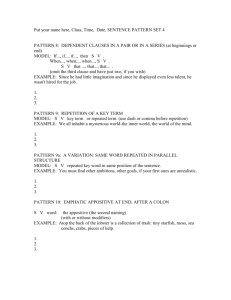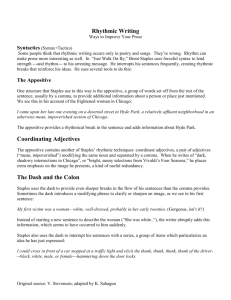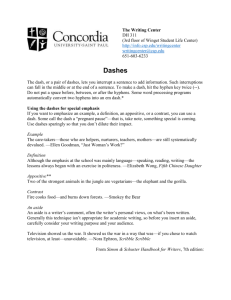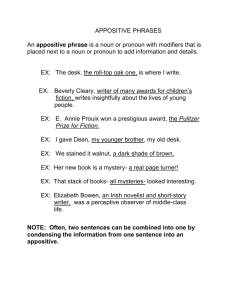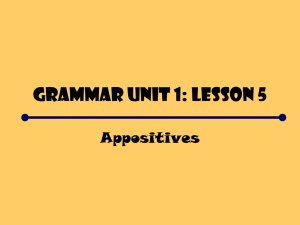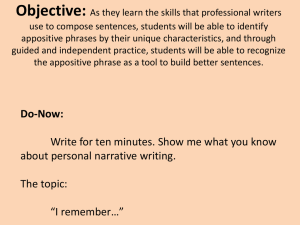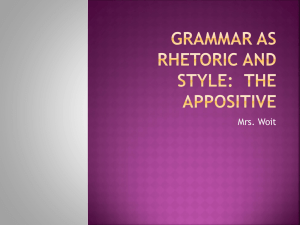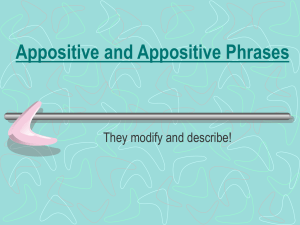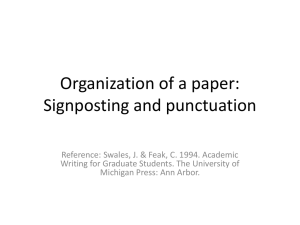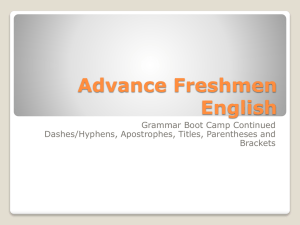Sentence Patterns 9
advertisement
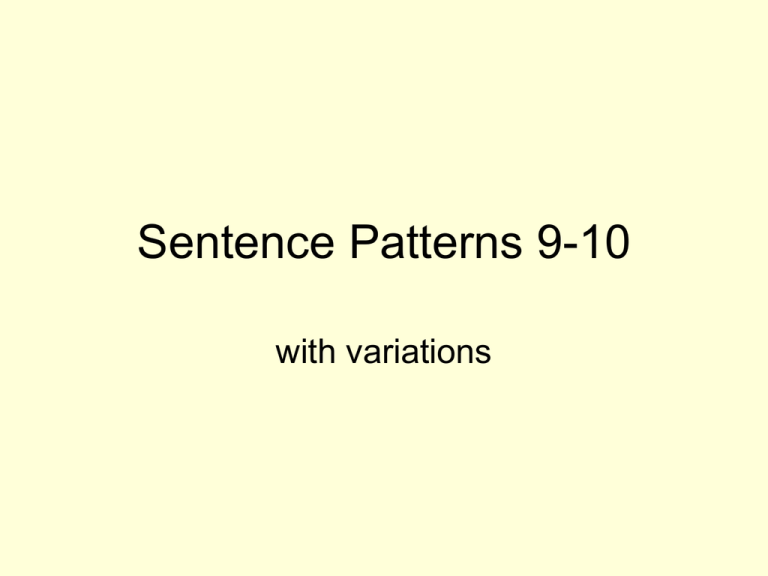
Sentence Patterns 9-10 with variations Pattern 9 Formula Repetition of a Key Term S V __ key term or , repeated key term. (use dash or comma before repetition) Explanation • Repeat a key word in a modifying phrase attached to the main clause. • Repeat the word exactly as it is, or you may use another form. – brute brutal; breath breathtaking; battle battling • Key term – Important – Anywhere in the sentence, but usually at the end • Dash or comma – dash = longer pause, a greater break in thought • Note 1: Key word must be worth repeating – Ineffective, uninteresting repetition: • He was a good father, providing a good home for his good children. • Note 2: Be sure attached phrase with the repeated key tern is NOT a complete sentence (or else you will create a comma splice) – Wrong: He was a cruel brute of a man, he was brutal to his family and even more brutal to his friends. – Correction: He was a cruel brute of a man, brutal to his family and even more brutal to his friends. Examples • We live in an uncertain world—the inner world, the world of the mind. • We all have problems but we can find a solution, a solution that works, a solution that is equitable. • She suddenly felt filled with joy—a joy she could not explain but that she gladly embraced. Checkpoints Double check that the repetition is a phrase, not a clause. – Wrong: He was part of the older generation, his generation was born before the Depression. – Correct: He was part of the older generation, a generation born before the Depression. Don’t use a period or semicolon where the comma should be. • Wrong: He praises the beauty of his love. A love that is unfortunately hopeless because it is not mutual. • Correct: He praises the beauty of his love, a love unfortunately hopeless because it is not mutual. Variation 9a Formula Same word repeated in parallel structure S V repeated key word in same position of the sentence. Explanation of Ways to Repeat 1. Repeat an effective adjective or adverb in phrases or clauses with parallel construction: • She has an incredible satisfying life, satisfying because of her career and satisfying because of her family. 2. Repeat the same preposition in a series: • He has known her for many years, before she went to college, before she was a star, before she won the Oscar. 3. Repeat the same noun as the object of different prepositions: • This government is of the people, by the people, and for the people. 4. Repeat the same modifying word in phrases that begin with different prepositions: • Sidney devoted his life to those selfish people, for their selfish cause, but clearly with his own selfish motives dominating his every action. 5. Repeat the same intensifiers: • The baseball game was very exciting, very enjoyable, but very long. 6. Repeat the same verb or alternative forms of the same word: • In order to survive in war, a person needs training, a person needs courage, and, most of all, a person needs luck. Examples • If you have unrealistic dreams, you may need to find other goals, other desires. • Venice presents great gifts to the visitor— great history, great art, great crafts. • His greatest discoveries, his greatest successes, his greatest influence upon the world’s daily life came to Edison only after repeated failures. Pattern 10 Formula Emphatic appositive at end, after a colon S V word: the appositive (the second naming) (with or without modifiers) Explanation • Withholding the repetition until the end of the sentence builds to a climax and provides a forceful, emphatic appositive that concludes the sentence and shouts for attention. • Colon marks a full stop – Use only after a complete statement – Anticipates an explanation Examples • Her room contained a collection of trash: old clothes, soda cans, McDonald’s wrappers. • When I go to the movies, I need two things to really enjoy it: popcorn and a soda. • Airport thieves have a common target: unwary travelers. Checkpoints Check the words before the colon; be sure they make a full statement (sentence). After the colon, be sure to write only a word or a phrase—not a full statement. Variation 10a Formula Appositive after a dash S V word — the appositive. (echoed idea or second naming) Explanation • Instead of colon, use a dash. – Dash almost always precedes a short climactic appositive – Colon generally precedes a longer appositive • Second naming is usually climactic or emphatic Effects of Punctuation • Adjusting to a new job requires one quality, humor. – (common usage but not emphatic) • Adjusting to a new situation requires one quality: humor. – (significant pause, but not so dramatic) • Adjusting to a new job requires one quality above all others—a sense of humor. – (dramatic signaling) • Adjusting to a new job requires one quality: the ability to laugh at oneself. – (more dramatic, more stylistically complete) Examples • Many traditional philosophies echo the ideas of one man—Plato. • Pandas eat only one food—bamboo shoots. • These big burgers taste great but they have lots of calories—over 1,000. Checkpoints The second naming must be a true appositive • Poor: One class of teenagers can be labeled— students. • Correct: One label would fit almost any teenager— student. A dash cannot separate complete thoughts. • Wrong: Mary Shelley spent a full year at Marlow writing Frankenstein—her monster has survived better than some of her husband’s poems. • Correct: Mary Shelley spent a full year at Marlow writing Frankenstein—creating a monster that has survived better than some of her husband’s poems.
